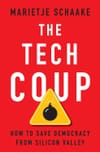Elon Musk's billionaire extremist party exposes ‘centrist’ scam
This is a guest post from FrameLab contributor Jason Sattler. Jason is LOLGOP on BlueSky and pretty much any other
Gil Duran inteviews Marietje Schaake about her new book "The Tech Coup: How to Save Democracy from Silicon Valley"

If Donald Trump wins the 2024 election, tech moguls like Elon Musk will capture an unprecedented amount of power. Trump has even suggested making Musk the head of a Government Efficiency department. This could give the tech billionaire the ability to defund or punish the same government agencies that currently regulate his businesses.
But even if Trump loses, democracy still faces an ongoing threat. That’s because governments around the world – including in the United States – have become increasingly dependent on private companies to carry out essential public functions. This funnels billions of taxpayer dollars to these companies, and it gives these corporations significant power over the rest of us.
In the 21st century, power that once belonged to governments now increasingly belongs to private companies. The United States has basically outsourced its space program to Elon Musk’s SpaceX. And it relies on Musk’s Starlink to provide access to the internet access in hard-to-reach places, like the battlefields of Ukraine. The US also increasingly relies on companies like Anduril, Google, Microsoft and Palantir to carry out basic functions of the government, the military and law enforcement. The list of such arrangements is long – and getting longer.
This systematic privatization of public power is a serious threat to democracy.
In a new book titled “The Tech Coup: How to Save Democracy from Silicon Valley,” Marietje Schaake examines the problem and shares a list of possible solutions. Schaake is a former member of the European Parliament who is now a fellow at Stanford University. She has studied the work of Dr. George Lakoff, and she deliberately frames this problem as a “tech coup.”
Schaake's book is frightening, but also hopeful. She believes citizens of democracy – and their elected leaders – can still reset the balance of power.
She writes:
I am not under the illusion that technology can be stopped. It should not be, and I am hopeful and excited about what technology can continue to bring to us all. Yet I am very critical of a powerful, unaccountable industry that, to date, has been almost entirely without guidance or guardrails from democratic authorities. Solving the accountability gap is particularly urgent because technology is not a sector but a layer that impacts almost all sectors.
For the FrameLab podcast, I interviewed Schaake about her book. Click below to listen on SoundCloud:
Listen to Gil Duran interview Marietje Schaake, author of "The Tech Coup: How to Save Democracy from Silicon Valley"
You can also listen on:
Subscribe